On 26th of April 2018, experts from all over Europe gathered at Moscow State University to discuss the state of international affairs and media coverage of EU-Russian relations in the context of strategic communication. The core topic of the international seminar as the headline suggests was the current relationship between the EU and Russia. Moreover, the discussion focused on challenges and opportunities presented by political, social and cultural aspects of communication.
The event was attended by students of Lomonosov Moscow State University (Advertising and Public Relations Department) and the Diplomatic Academy of the Ministry of Foreign Affairs of the Russian Federation; the moderators being Dr. Anna Kostikova, Chair of the Department of Philosophy of Language and Communication at the Faculty of Philosophy of Lomonosov Moscow State University and Prof. Evgeny Pashentsev, a leading researcher at the Center for Euro-Atlantic Studies and International Security at the Diplomatic Academy of the Ministry of Foreign Affairs of the Russian Federation. The seminar was supported by the International Centre for Social and Political Studies and Consulting (ICSPSCS), the European – Russian Communication Management Expert Network (EU-RU-CM Network), and the Association of Studies, Research and Internationalization in Eurasia and Africa (ASRIE).
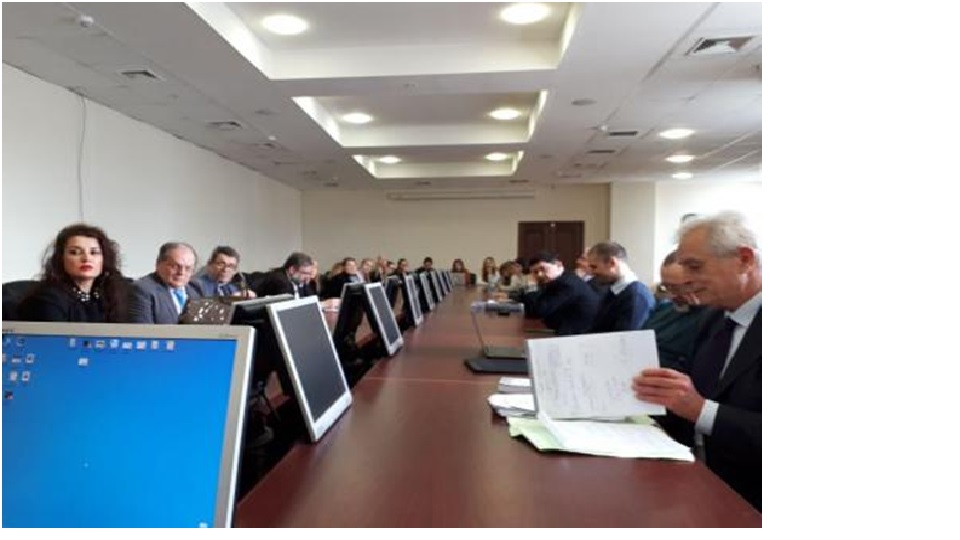
The role of strategic communications in politics was a cross-cutting theme of the discussion. Due to the geographical and cultural diversity of participants, attendants were able to analyze a multi-dimensional image of Russia across the media space of different European countries.
Dr. Anna Kostikova opened the meeting by introducing the hosting Faculty of Philosophy and the Department of Philosophy of Language and Communication, the areas of research at the Department and it’s broad ties with different academic institutions abroad.
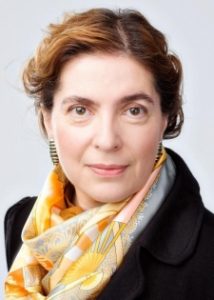
Prof. Evgeny Pashentsev emphasized the importance of strategic communication during turning points in human history, the present geopolitical situation being one of these pivotal moments. Furthermore, the synchronization of words (official statements) with deeds is more important than ever.
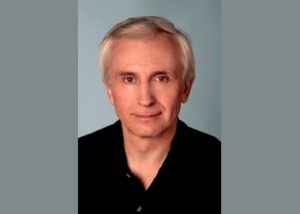
Giuliano BIFOLCHI, Co-Founder of the Association of Studies, Research and Internationalization in Eurasia and Africa (ASRIE), analyst in security, conflicts and international relations.

Paper’s topic: “Italian media presentation of Russian Federation”.
The first word was given to Mr. Giuliano Bifolchi (Italy), the topic of his paper being «Italian media presentation of Russian Federation». The key points were the specifics of the Italian media market: the difficult registration process for media and the large number of competing newspapers, both pro-Russian and vice versa. The main part of Mr. Bifolchi report was the semantic analysis of Italian sources regarding Russia. «Russia is a topic which divides the public opinion, media agenda, broadcasting corporations and newspapers in Italy. Despite the fact that main media agencies and newspapers have depicted Russia as a threat and an aggressive country, now in Italy there is a progressive affirmation of a new model of journalism which goal is to provide 360 informational coverage» — finished Mr. Giuliano Bifolchi.
Victor BULMER-THOMAS, Associate Fellow in the United States and the Americas Programme at Chatham House, Honorary Professor at the Institute of the Americas UCL
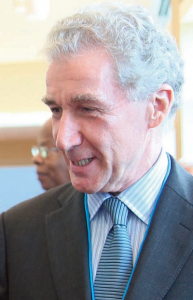
Paper’s topic: British-Russian Relations after Brexit. (Photo by Inta Pilineitse)
Next, Prof. Victor Bulmer-Thomas (UK) presented his paper on British-Russian Relations after Brexit. Despite the changes the UK is going to experience as an aftermath of its withdrawal from the EU, the country remains solidary with the European countries concerning the main political issues. Moreover, during the next few years the British government is going to closely follow the political line of USA as an attempt to keep its geopolitical influence. At the same time, British-Russian economic relations will be transformed due to new FTA (free-trade area) contracts between the UK and the Eurasian Economic Community.
Another hot topic in his speech was the rumoured migration of Russian oligarchs and the influx of foreign investments. «Though the Russian community is mostly concentrated in London and is divided, there is an economic interest in relations warming» — stated Dr. Bulmer-Thomas.
Rolf CLAUBERG, co-founder of the Swiss company InterKulturForum GmbH.
(Photo by Inta Pilineitse)
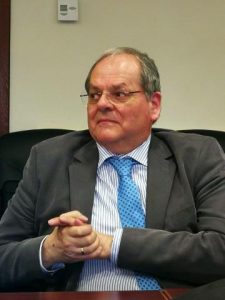
Paper’s topic: “EU- Russia : confrontation and misunderstandings in mass media”.
Next, the podium was taken by Prof. Rolf Clauberg (Switzerland), who brought up the subject of confrontation and misunderstandings in mass media. In the researcher’s opinion, there are the long-established biases that have a great impact on the formation of public opinion and the perception of Russia. Such biases were created by the USA as an attempt to discredit the USSR during the Cold War. Unfortunately, they are still living within a common mind-set. «The aim was to make sure that Europe would not unite with Russia» — said Mr Clauberg. The situation is also complicated by the absence of many-sided sources to verify information. However, the first step must be realizing your own biases and not acting on them.
Marija DJORIĆ (Serbia), Assistant Professor at the European Faculty of Law and Political Sciences, and a secretary of master studies terrorism, organized crime and security at Belgrade University.
(Photo by Inta Pilineitse)
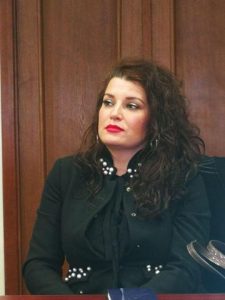
Paper’s topic: “Russian Federation Foreign Policy in Serbian Media”.
As a foreword, Dr. Marija Djorić described the present state of Serbian media market. As it turned out, the country has more than 436 media frequencies, among them 117 non-public broadcasting TV-channels. There is also a certain number of pirate stations. Today, the most demanded types of program among the television auditorium are informative content, foreign movies and sport programs.
The second part of the report focused on a comparative analysis of two opposing news portals: N1 and Sputnik. In spite of the pressure of foreign media in Serbia «Russia is perceived as a friendly country» — noted Marija Djorić. As it came to light in a recent poll 58% of the interviewees cited Vladimir Putin as the world leader they could trust. The research was conducted by «Politika» and «Faktor plus» in March. «Overall, 42% of Serbians believe that Russia is the guarantee of economic and military security» — Maria finished her talk.
Peter LINKE (Germany), independent analyst, member of the International Institute for Strategic Studies (IISS), the German Council on Foreign Relations (DGAP).
(Photo by Inta Pilineitse)
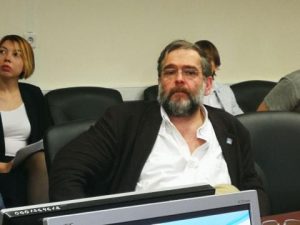
Paper’s topic: ”Eurasianism as a political message for the EU”.
Mr. Peter Linke built his speech around the notion of Eurasianism. In that light Russia certainly has an advantage being located half in Europe and half in Asia. As we live now in a trans-cultural global world or at least are trying to create such a society, bringing East and West together is one of the biggest cultural challenges at hand. Polyphonic culture has proved itself to be a necessary element for the integration of pluralistic views as without them constructive dialogue is simply not possible.
During the open-talk, students from MSU and the diplomatic academy got an opportunity to ask their questions. The main issue discussed was media dividing people and nations. Which is more, the political role of the young generation stays uncertain. But without a doubt, the next generation will differ greatly from the current electorate.
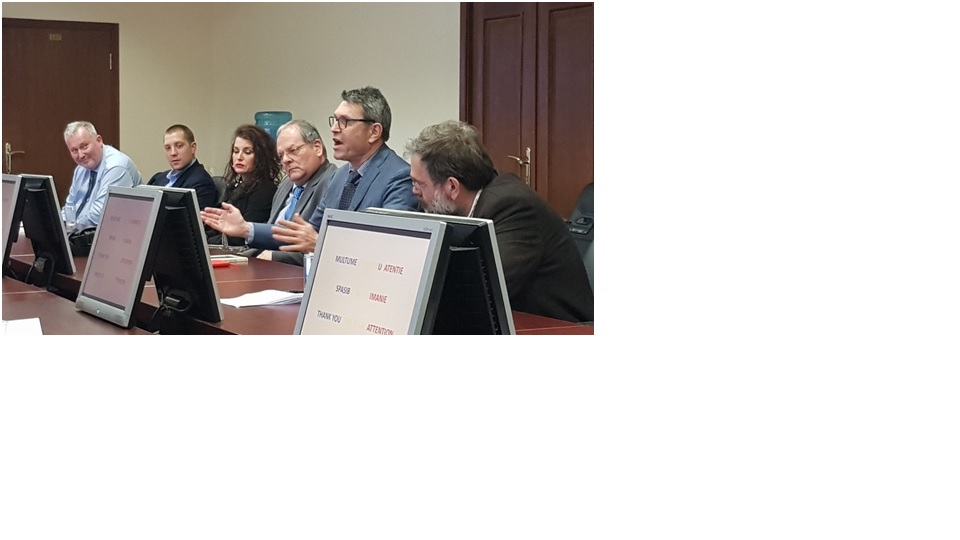
Secondly, the attendants talked about «truth» in politics. As the speakers pointed out «in politics, there is only interest and the truth is somewhere in the middle». Moreover, nowadays we have access to an astonishing variety of media channels, both classic and new, born from the digital and internet revolution. Changes ought to come in the nearest future and good education combined with a critical mind is in high demand.
Lastly, demagogy in politics and media space poses a serious threat as terminology has become a battlefield. Words hold power and new terms are appearing as alternatives to old ones or right-out opposition to populist tissue of lies. For instance, governance against democracy. Can we even talk about a global good governance (on global scale)? The answer to this question remained uncertain, as participants all stayed to their own.
Between the two sessions of the seminar, a presentation of a collective monograph: «Strategic communication in EU-Russia Relations: Tensions, Challenges and Opportunities» (ed. Evgeny Pashentsev, Erik Vlaeminck) took place.
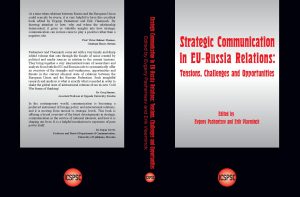
Researchers from five countries: Belgium, France, Italy, Russia, Romania participated in the production of this book. The author of the preface for the book is Franco Frattini, the President of the Italian Society for International Organization, a Former Italian Foreign Minister, and a Vice-President of the European Commission and Commissioner for Justice, Freedom and Security. Six well-known researchers from Australia, Argentina, Britain, Slovenia and Sweden endorsed the book. One of them, Dr. Greg Simmons, an associate professor from Uppsala University gave his comments on this international volume.
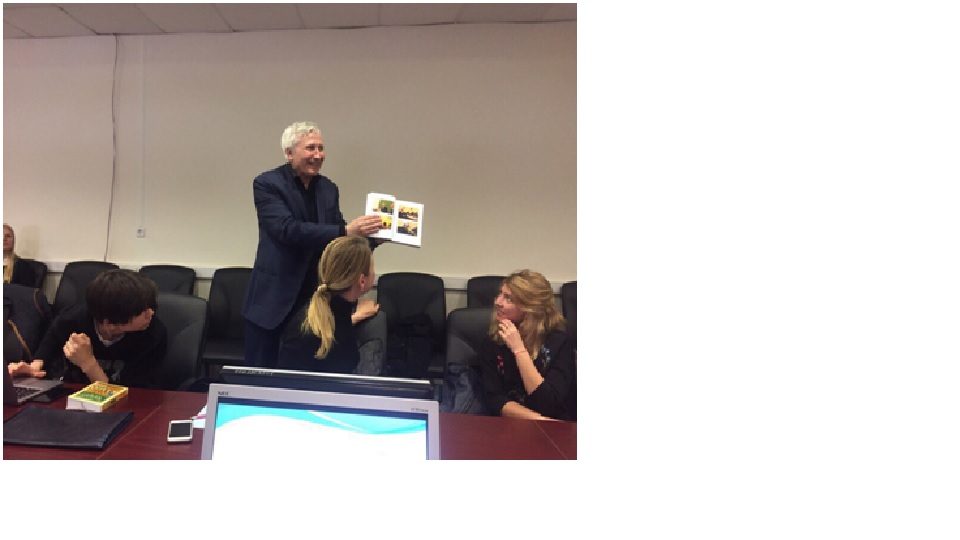
Prof. E. Pashentsev presents the collective monograph. (Photo by Inta Pilineitse)
As both authors explained, on the one hand, it is a book that produces ideas and depicts the challenges and opportunities presented before the EU states and Russia. On the other hand, it is a book about bridges: political, cultural, social and economic. And the biggest bridge in our history that we are only about to cross is the changes in our global society. We don’t know what is on the other bank of the river and must do everything to remain human beings and at the same time change ourselves for the future reality.
Marco RICCERI (Italy) – Expert, European social and labour policies, is acting as general secretary of the EURISPES (Institute for Political, Social and Economic studies), Coordinator of the European-Russian Communication Management Network.

Paper’s topic: The EU-Russia communication Strategy: Reflections on the Ultimate Goals.
Prof. Marco Ricceri’s talk opened the second part of the seminar. He presented an analysis of European documents dealing with strategic communication. His work shows that the EU depicts Russia as an aggressive state creating tensions. The metaphor of a home ran throughout the report. The EU-countries and Russia could have a common home, but now it is more divided than ever. Despite that healthy pragmatism and common sense should win and a common economic and social platform be established. «We see a lot of experts and top-managers thinking about a possible future, we proudly state that we are an information society, a knowledge society. But we are still not certain where we are going» — concluded Prof. Ricceri.
Marius VACARELU (Romania), National School of Political Science and Public Administration, Bucharest.
(Photo by Inta Pilineitse)

Paper’s topic: “EU – Russia: Mutual Interests, Mutual Agreements”.
«Interests are an engine of our life» — began Dr. Marius Vacarelu. Whether in a good or a bad way remains uncertain, but interests rule our life — be it a person or a state. Today, you can’t stay isolated as it means living in a whole different economic and psychological reality. Defending your interests is more or less correct. Though it can be seen as threatening, imposing or even immoral. For that we need a relevant ethical compass, we need values. Balance between interests and values is what all political agents should strive for.
Greg SIMONS (Sweden), associate professor at Uppsala University.
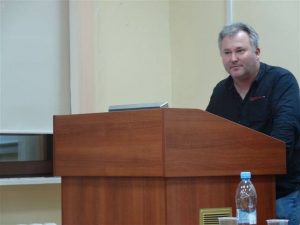
Paper’s topic: Information Dominance: Use of Fake News and Moral Panic in Information Warfare.
The topic of Dr. Simons speech was fake news. The term was chosen as word of 2017 by the Collins English Dictionary — at last the public community recognized the moral panic and hysteria around fake news. It is known, that the phenomenon is largely used as a means to information dominance in the media space. It is a strategic tool that can help deny enemies opportunities to act in that space.
During his speech, Dr. Simons pointed out that the meaning of «fake news» changed with time from something that contradicts your personal beliefs and world view to an instrument of mass deception. «If we are talking about logic, most times fake news are poorly constructed. Although, it is certainly not the case as fake news work on the basis of emotions. We instinctively act on emotions and according to suggestions made to us. In the end,the idea behind the use of fake news is creating a crisis and controlling the flow of information» — stated Dr. Simons.
Erik VLAEMINCK (Belgium), a PhD student at the University of Edinburgh.
(Photo by Inta Pilineitse)
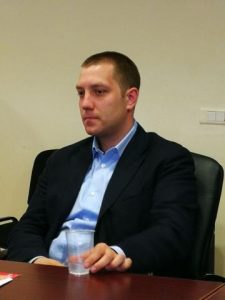
Paper’s topic: Culture and Strategic Communication in EU-Russia Relations: From Alleged Clash of Civilizations to Prime Source for Reviving the Dialogue.
The last speech was opened by a quote from the EU’s High Representative of the European Union for Foreign Affairs and Security Policy Frederica Mogherini: «Culture brings people closer, prevents conflicts and helps wounds to heal». As was stated earlier, culture is a bridge in communication, political or not. It is a low-cost source of communication, which holds great potential for international dialogue. Culture is unique. It shows different faces and places, it builds empathy, brings people together. But most of all, it is a shield against growing stereotypes and misunderstandings.
See more about the seminar: “EU – Russia: challenges and opportunities for mutually beneficial strategic communication”



 0
0 12017 Views
12017 Views 1 May 2018
1 May 2018 Olga Levunina, Lomonosov Moscow State University
Olga Levunina, Lomonosov Moscow State University